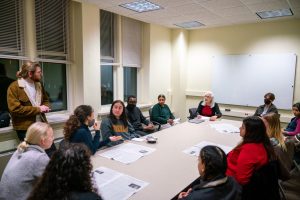Safia Elhillo Delivers Sharp, Candid Poetry Performance
September 15, 2017
“As usual, I was thinking about race; I wrote a poem.” said Sudanese-American performance poet Safia Elhillo as she delivered her sassy wit in a soothing voice last Friday at the Cat in the Cream.
Author of the full-length poetry collection The January Children, Elhillo is an acclaimed slam poet who has performed at the South African State Theatre, the New Amsterdam Theater on Broadway, and at TEDxNewYork, and has competed nationally with the New York University collegiate championship slam poetry team and the DC Youth Slam Poetry Team. Having earned accolades including the 2015 Brunel University African Poetry Prize (co-winner) and the 2016 Sillerman First Book Prize for African Poets, Elhillo, though young, is truly a veteran poet with a wealth of experience and literary prowess to offer.
Elhillo’s poetry largely consists of reckonings with her personal experiences of being a Black Muslim woman and expressions of the struggles that she has encountered in her search for belonging. The stories she told involving her childhood obsessions, like the Egyptian pop star Abdel Halim Hafez, her relationships with various family members, and her complex experiences with country, race, and language truly resonated with the audience.
“There were a few things I could relate to, maybe not to the same extent, but [the idea of] having ‘an accent in every language’ [spoke to me],” College first-year Bhairavi Mehra said, quoting Elhillo’s “Date Night with Abdelhalim Hafez.”
Elhillo’s poetry and the issues she advocates for evoked an emotional response from the audience.
“It speaks specifically to me because I’ve never had someone who really speaks to me as a Black Muslim woman, who writes poetry like this — that I’m able to hear and truly resonate with.” College senior Muntaha Mohamed said. “[Her poetry] is like a way of being and living, especially at the intersections of so many different identities and different continents. [She is] speaking for children of immigrants, for Blackness — for so many different people.”
The emotional and the political connectivity created by Elhillo’s poetry for other audience members was awe-inspiring.
“I thought [the references to race and color] were beautiful,” said College senior Deborah Johnson, co-president of OSlam, Oberlin’s slam poetry club and team. “I think she talks about how poetry is really political and how the political relates to the personal.”
Elhillo delivered her poetry softly but deliberately, using simple language that alluded to bodies, countries, and oceans.
“What I took away from the performance is that there is no singular slam voice, and the way she tells stories is so particular to her own,” Johnson added. “[She] really emphasizes that you don’t need to be loud or very intense to tell stories in your own particular way.”
Many Arabic words and concepts are included in Elhillo’s work. In finding this unique blend of Arabic and English, Elhillo has found an honest niche in which to create her poetry. Ghazals are a particular rhyming, metered poetic form that originate from the ancient Arabic poetry tradition. Ghazals traditionally deal with themes of the pain, loss, separation, and beauty found in love.
“The ghazal is one of my favorite forms,” Elhillo said.
In “Ars Poetica”, Elhillo writes, “I want the old music back to thicken my tongue/& open my mouth/& close the wound the ocean made.” She speaks of the pain of being different in Sudan and different still in the U.S., as well as the space she has found in a mix of Arabic-English writing. She quoted Assia Djebar’s L’Amour, la fantasia when she said, “Autobiography practiced in the enemy’s language has the texture of fiction.” Living by this quote, Elhillo tells her stories in her unique tongue of Arabic and English combined.
Elhillo is currently reading the works of contemporary writers who identify as ethnic, queer, and immigrant.
“Kaveh Akbar just released an incredible new book of poems called Calling a Wolf a Wolf.” Elhillo said. “He also has a chapbook called Portrait of the Alcoholic, which I think is my favorite thing I’ve ever laid eyes on.”
She listed some of her other favorites, such as Don’t Call Us Dead by Danez Smith, Electric Arches by Eve Ewing, and The Kitchen-Dweller’s Testimony by Ladan Osman.
The main aspiration expressed in Elhillo’s poetry is the need to move away from poetic convention and the notion of what poets look like to create space for a new generation of young, diverse writers.
“This idea that poetry is this buttoned-up thing for old white men in the forest is disintegrated, ultimately,” she said to approving cheers from the audience at the Cat in the Cream. “The amazing thing about knocking down the smoke screen is that all these poets are on Twitter and in the world and still being young and participating in regular young person stuff.”
At the end of the night, the message the audience took from Elhillo’s simple, unpretentious performance was that poetry can be simply about telling an authentic story.
“I think it’s important [to hear her] because we’re political, and hearing stories of other people and humanizing them is something we all need to hear, no matter what spaces we’re in,” Johnson said.

























